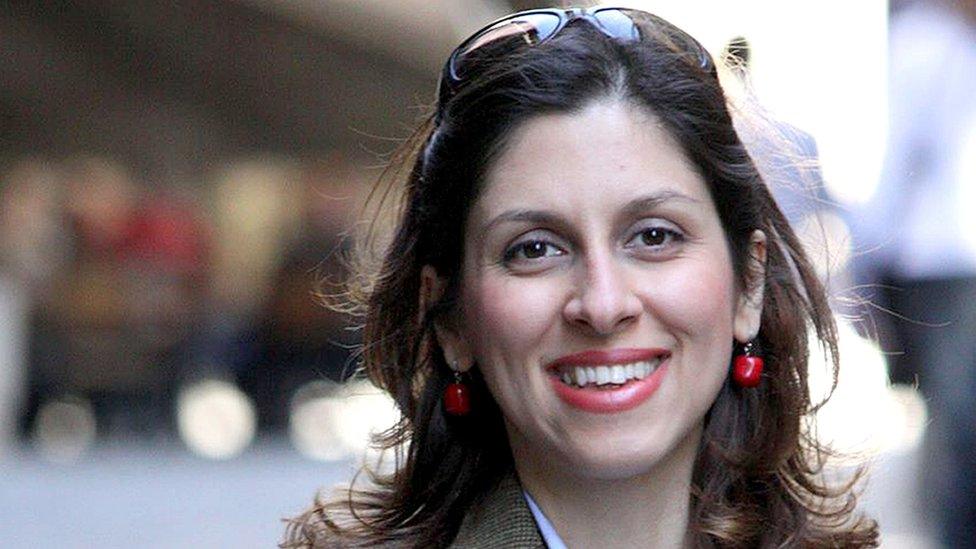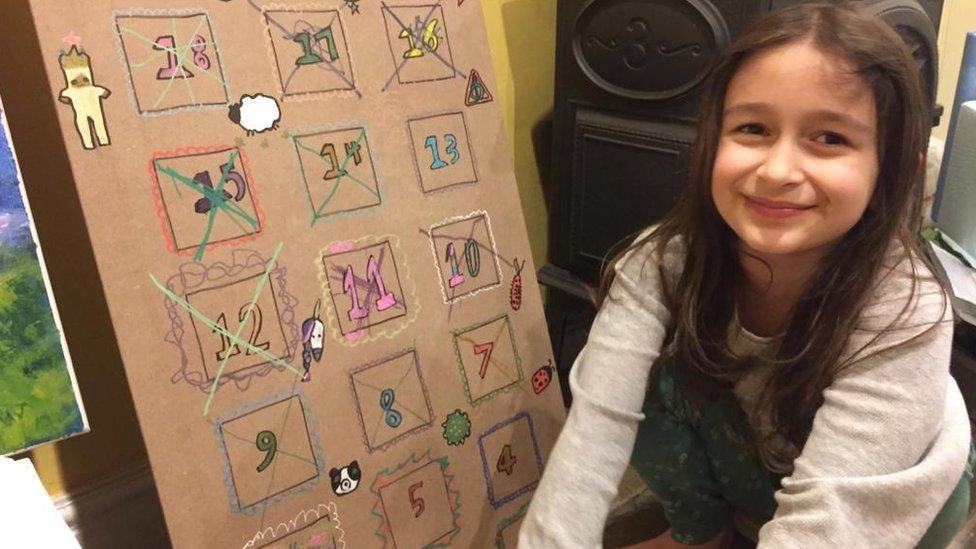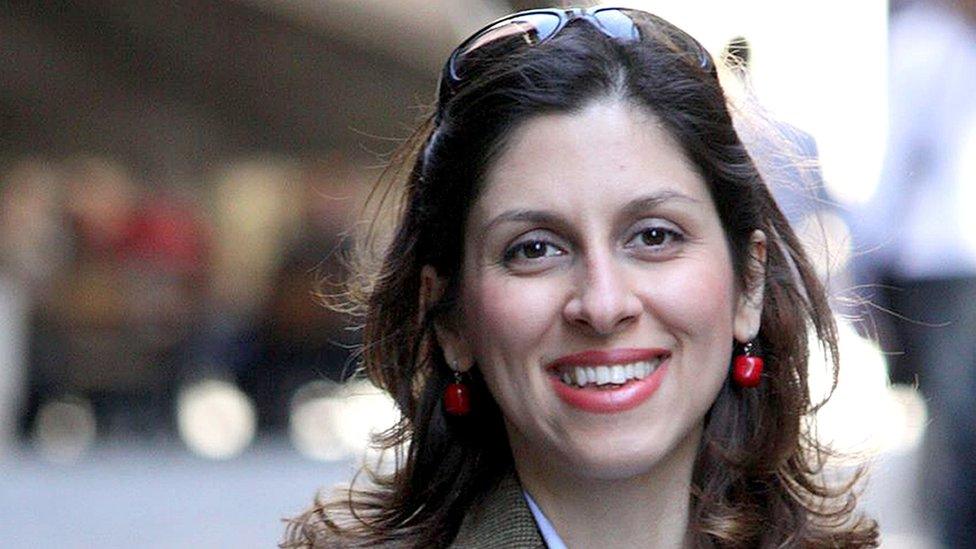Nazanin Zaghari-Ratcliffe sentenced to a year in Iran prison
- Published

Nazanin Zaghari-Ratcliffe has been sentenced to a further year in prison and a one-year travel ban after being found guilty of propaganda against the Iranian government.
Her lawyer said she was accused of taking part in a protest in London 12 years ago and speaking to the BBC Persian service.
The prime minister said the UK would "redouble" efforts to free her.
The British-Iranian charity worker was first jailed in Tehran in 2016.
She has always denied the spying charges levelled against her.
Confirming the latest sentence, her husband, Richard Ratcliffe, said the court's decision was a bad sign and "clearly a negotiating tactic" by the Iranian authorities - who are in the middle of discussions over the country's nuclear activities.
Mrs Zaghari-Ratcliffe has not been taken to prison yet, her husband said, and plans to appeal against the sentence.
"The threat is there, and the threat is bigger than we were fearing." Mr Ratcliffe told the BBC. Referring to the possibility of being separated from his wife until summer 2023, he said: "I think the worst case got a bit closer."
Mr Ratcliffe has not seen his wife in person since her imprisonment in 2016. Their daughter, Gabriella, who was with her mother in Tehran when she was arrested, has been with him in the UK since 2019.
Prime Minister Boris Johnson said: "I don't think it is right at all that Nazanin should be sentenced to any more time in jail."
He said it was "wrong that she is there in the first place" and pledged to work hard to secure her release so she could return to her family, "just as we work for all our dual national cases in Iran".
"The government will not stop, we will redouble our efforts, and we are working with our American friends on this issue as well," Mr Johnson said.
Mr Ratcliffe maintains his wife was imprisoned as leverage for a debt owed by the UK over its failure to deliver tanks to Iran in 1979.

Mrs Zaghari-Ratcliffe's daughter Gabriella, now six, had counted down the days to her mother's release
He says the case may also be caught up in negotiations over the international agreement to limit Iran's enrichment of nuclear material, which the UK and others are trying to revive.
The sentencing may mean that part of the Iranian regime is unhappy with the direction of the negotiations taking place in Vienna and is signalling that things can get worse for Mrs Zaghari-Ratcliffe and other jailed dual nationals, Mr Ratcliffe said
Last year, Mrs Zaghari-Ratcliffe was moved from prison due to the coronavirus crisis and held under house arrest in Tehran until March, when her ankle tag was removed.
But she returned to court later that month to face the latest propaganda charges.

Analysis: What will it take to free Nazanin?
by Caroline Hawley, BBC diplomatic correspondent
The new sentence is a bitter blow to Nazanin Zaghari-Ratcliffe and her family, who have campaigned relentlessly to get her home for five years.
Mr Ratcliffe says the sentence is worse than he'd expected - but that a guilty verdict was guaranteed.
He has consistently said that she's being held as a hostage on trumped-up charges - and fears that she will only be freed if Iran gets something in exchange.
In this, the Iranian regime certainly has form.
Last November, it released the British-Australian academic Kylie Moore Gilbert, who'd been sentenced to 10 years for spying. That was in exchange for three Iranian prisoners in Thailand - two of whom had been convicted over a bomb plot.
And back in early 2016, when Iran's nuclear agreement came into force, Iran freed an American journalist, Jason Rezaian, in a prisoner swap.
It's no coincidence, Mr Ratcliffe believes, that this verdict has come just as negotiations are taking place to revive the deal.

Labour MP Tulip Siddiq, who represents the family's north London constituency, said they had been "hoping and praying" she would soon be free but instead she was "being abusively used as a bargaining chip".
Ms Siddiq said the UK government's behind-the-scenes efforts to secure her release had "clearly failed", saying, "We deserve an urgent explanation from ministers about what has happened."
Former foreign secretary Jeremy Hunt said, "Iran's cruelty seems to know no bounds," but he questioned why the UK had not simply settled the tank debt, given it accepted it owed the money.
Liberal Democrat foreign affairs spokesperson Layla Moran called for the government to impose targeted sanctions against the officials responsible in Iran.
A medical evaluation carried out for the human rights charity Redress recently found Mrs Zaghari-Ratcliffe had post-traumatic stress disorder, depression and obsessive stress disorder due to "traumatising experiences in the prisons of Iran" and the uncertainty about her fate.
Richard Ratcliffe: "I think it was worse than I was expecting"
She told doctors that, during solitary confinement at the beginning of her sentence in 2016, she was interrogated - often while blindfolded - for eight to nine hours a day.
Redress director Rupert Skilbeck said a further sentence could cause "irreparable damage to her health" after the "torture and ill-treatment" she had already been subjected to.
"Nazanin has never received a fair trial in Iran and is innocent of the allegations made against her. Her detention has always been illegal under international law," he said.
"The case must be dismissed and she should be allowed to return to her husband and daughter in the UK immediately."
Amnesty International UK's director, Kate Allen, said Mrs Zagari-Ratcliffe had twice had to face a "sham trial" in Iran. "We fear that going back to jail will be almost too much for Nazanin to bear," she said.

UNCONVENTIONAL WAYS TO EARN A LIVING: Stream Young, Welsh and Bossin' It now
OH! WHAT'S OCCURRING?: All three series of Gavin and Stacey on iPlayer

Related topics
- Published14 March 2021
